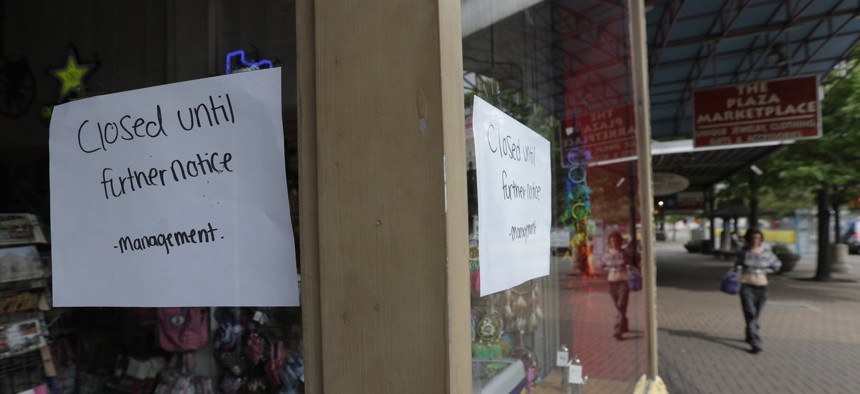Connecting state and local government leaders
Not all businesses have been able to survive the coronavirus pandemic.
As states start to reopen, the first picture of how many businesses have closed their doors for good is starting to emerge.
Businesses have struggled to pay rent and retain employees as the pandemic forced governors to order major shutdowns across the country. Small, locally owned companies were particularly hard hit, especially those owned by minorities and people with criminal records, who did not see much help from federal programs intended to keep businesses afloat during the pandemic. Some who received aid said the rules about spending it are so convoluted and restrictive they’re afraid to use the money available to them.
In Asheville, North Carolina, the owners of Addissae, the city’s first Ethiopian restaurant, said that they were “heartbroken” to announce that they were closing permanently this week.
“This has been an incredibly hard decision to make because Addissae has been doing so well and we have had so many old and new friends coming to enjoy our food,” owners Neera Kebede and Vicki Schomer said in a post on Facebook. “These past 5 years as a part of the Asheville community and with all of you as a part of our Addissae family have touched our hearts in ways we never could have expected.”
Similar statements are popping up on the social media pages of locally-owned businesses in cities across the country—especially in the restaurant industry, which has been particularly hard-hit by the economic downturn. The food news website Eater has been keeping a running list of shuttered eateries for each major city, and the numbers in most places have already reached double digits. Some of the restaurants that are closing have been around for 40 or 50 years.
In a report released by Facebook last week that surveyed 86,000 small business owners and employees across the country, one-third said they did not plan to reopen. Of those, another third said the decision was based on the fact they can no longer afford their bills or pay their rent. “Despite the 50% decline in sales we still have to pay 100% of our fixed costs,” one respondent wrote. “This is impossible. Rent was already high. Now it makes up 50% of our gross income.˝
Among the two-thirds of businesses that indicated they will reopen, 41% of owners said they plan to dig into personal savings to cover some costs and 55% said they would not be able to rehire all employees. Some respondents said they would need additional aid to get back on their feet, but others rejected the idea that federal or state relief could ever make up for the loss in revenue. “Small businesses are suffering and no amount of stimulus money can replace a thriving and functional business,” wrote one respondent.
The report aligns with other state-by-state surveys of businesses, where owners have expressed similarly grim outlooks. Close to half of all businesses in Wisconsin say they cannot survive current conditions, and only 28% of those in Michigan say they are “positive” they can stay open.
Consumer predictions of what business prospects will look over the coming years are similar. In a New York Times poll conducted this month, only one in five respondents said that overall business conditions will be “very” or “somewhat” good over the next year. Sixty percent said they anticipate that “periods of widespread unemployment or depression” will continue over the next five years.
In some places, businesses and nonprofit organizations dependent on tourism may not have closed yet, but leaders say that the financial picture moving forward is not bright. In New York, the Tenement Museum, which showcases the urban immigrant story in America, relies on admissions and gift shop sales for 75% of its $11.5 million annual operating budget. On the hook for $50,000 per month for their building’s mortgage, president Morris Vogel said he fears the institution may not survive.
“[If] this epidemic doesn’t clear in June, July, August … with no confidence about where it’s going by the end of summer, and we’re closed,” Vogel said in a report about the financial status of the city’s cultural institutions. “Worst, worst, worst case? We owe $50,000 a month to the bank … The bank can take [our buildings]. We have to give them the keys. We’re a memory.”
But the fate of organizations like the Tenement Museum, as well as small businesses that depend on people being willing and able to go out and spend money, is still unknown. Even though early numbers and surveys are helpful, the true impact of the pandemic on small businesses will only appear with time, experts say.
Moody’s Analytics chief economist Mark Zandi told CNBC that unlike the 2008 financial crisis, during which lots of large companies declared bankruptcy, the brunt of the fallout from the coronavirus pandemic is more likely to land on smaller entities. “There were approximately 8 million establishments prior to the Covid crisis, and I wouldn’t be surprised if close to 1 million of these firms don’t make it through to the other side of the pandemic,” Zandi said. “Most of these firms will be among the 6.5 million micro businesses with fewer than 10 employees … I think this is more of a small business problem and there’s going to be more failures.”
Emma Coleman is the assistant editor for Route Fifty.

NEXT STORY: 14-Day Quarantine Complicates Tourist Rentals




